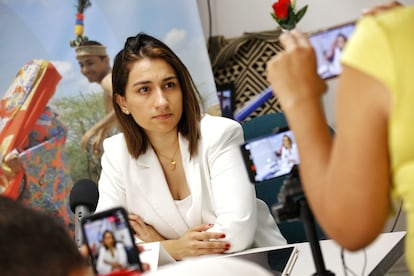Colombia’s president Petro’s disgraced aide is back
Following a wiretapping and polygraph scandal, the leader’s closest advisor, Laura Sarabia, returns to his side wielding more power than ever


Laura Sarabia, Colombian president Gustavo Petro’s closest advisor, has just told the general attorney’s office that she never gave the order for her son’s nanny to be subjected to a polygraph test after a suitcase packed with $7,000 was taken from her apartment.
The case, which also saw the dismissal of Petro’s key political power broker, Armando Benedetti, generated monumental noise on social networks. But while the wiretapping and polygraph case may haunt Sarabia, her acquittal means she has been barely three months out of the government. In fact, people close to the cabinet maintain that she never really left at all. Last August she was appointed director of the Department of Social Prosperity (DPS), a position that sees her managing a budget of $6.75 billion, including subsidies for the country’s poorest.
The image of Sarabia descending the steps of the presidential plane on an official trip to China in October showed that the illegal wiretapping and polygraph scandal involving her son’s nanny had not undermined her power. She was still the person closest to the head of state. And, in the last few days, over and above her official duties, Sarabia has chaired a meeting to try to save the celebration of the Pan American Games in Barranquilla, and another with representatives of the banking sector, making her the face of Colombia’s Government.
On January 18, Sara was called to the attorney general’s office to testify for the alleged abuse of power against her nanny, Marelbys Meza. She arrived confident and eager to speak, a far cry from her silence when the scandal first broke in early summer last year. For the first time, she referred publicly and forcefully to a process that became so convoluted it provoked the biggest crisis of Petro’s government in its first year in office. “I did not give any order; there was no polygraph on my initiative,” she said before entering the judicial headquarters.
The scandal broke when Meza’s allegations against Sarabia appeared on the cover of Semana magazine. The nanny accused Sarabia’s security team of having subjected her to a polygraph in a basement of the residential palace, the Casa de Nariño, stating she was the main suspect in the theft of the suitcase containing $7,000.
Meza’s phone was also said by the attorney general to have been illegally tapped. Considered by those who know her as methodical and strict, Sarabia was in tight corner in June last year. The final blow was dealt to her by Benedetti, who was alleged to be behind Meza’s media appearances. He and Sarabia had been boss and subordinate for years, but a power struggle had put distance between them. The young woman’s shift to the president’s side and Benedetti’s posting as ambassador to Venezuela unleashed the wrath of the politician, who felt banished and plotted revenge from afar. The president was forced to dismiss both members of staff, although he addressed Sarabia as “my dear civil servant” as he bade her farewell.
While little has been heard of Benedetti since, Sarabia continued to have a direct line to Petro. The day he took her back into the fold, the message was clear: he was not willing to dispense with his greatest support in a cabinet which has seen the dismissal of 11 ministers since he took power in August 2022. Despite the criticism and the potential political cost, Sarabia now enjoys more power than ever.
There are numerous questions still to answer in the illegal wiretapping and polygraph case, but Sarabia appears undaunted. Her defense has said that “there is not a shadow of doubt regarding her conduct” and Sarabia trusted that a “righteous and dignified” judicial process will help her to turn the page of what she considers “a bitter” period in her life.
Sign up for our weekly newsletter to get more English-language news coverage from EL PAÍS USA Edition
Tu suscripción se está usando en otro dispositivo
¿Quieres añadir otro usuario a tu suscripción?
Si continúas leyendo en este dispositivo, no se podrá leer en el otro.
FlechaTu suscripción se está usando en otro dispositivo y solo puedes acceder a EL PAÍS desde un dispositivo a la vez.
Si quieres compartir tu cuenta, cambia tu suscripción a la modalidad Premium, así podrás añadir otro usuario. Cada uno accederá con su propia cuenta de email, lo que os permitirá personalizar vuestra experiencia en EL PAÍS.
¿Tienes una suscripción de empresa? Accede aquí para contratar más cuentas.
En el caso de no saber quién está usando tu cuenta, te recomendamos cambiar tu contraseña aquí.
Si decides continuar compartiendo tu cuenta, este mensaje se mostrará en tu dispositivo y en el de la otra persona que está usando tu cuenta de forma indefinida, afectando a tu experiencia de lectura. Puedes consultar aquí los términos y condiciones de la suscripción digital.








































